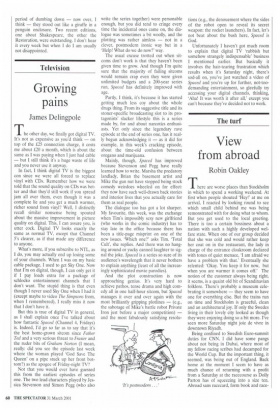Growing pains
James Delingpole The other day, we finally got digital TV. It's not as expensive as you'd think — on top of the £25 connection charge, it costs me about £20 a month, which is about the same as I was paying when I just had cable — but I still think it's a huge waste of life and you never use it anyway.
In fact, I think digital TV is the biggest con since we were all forced to replace vinyl with CDs. Remember how we were told that the sound quality on CDs was better and that they'd still work if you spread jam all over them, even though it was a complete lie and you get a much warmer, richer sound from vinyl? Well, I distinctly recall similar nonsense being spouted about the massive improvement in picture quality on digital. This, I can assure you, is utter cock. Digital TV looks exactly the same as normal TV, except that Channel 5's clearer, as if that made any difference to anyone.
What's more, if you subscribe to NTL, as I do, you may actually end up losing some of your channels. When I was on my basic cable package, I used to get Sky One. Now that I'm on digital, though, I can only get it if I pay loads extra for a package of schlocko entertainment channels that I don't want. The stupid thing is that even though I never used Sky One when I had it (except maybe to video The Simpsons from, when I remembered), I really miss it now that I don't have it.
But this is true of digital TV in general, as I shall explain once I've talked about how fantastic Spaced (Channel 4, Fridays) is. Indeed, I'd go so far as to say that it's the best home-grown sitcom since Father Ted and a very serious threat to Frasier and the ruder bits of Graham Norton (I mean, really: did you see the episode last week where the woman played 'God Save The Queen' on a pipe stuck up her front bottom?) as the apogee of Friday-night TV?
Not that you would ever have guessed this from the earliest episodes of series one. The two lead characters played by Jessica Stevenson and Simon Pegg (who also write the series together) were personable enough, but you did tend to cringe every time the incidental ones came on, the dialogue was sometimes a bit woolly, and the plotting was rather aimless — not in a clever, postmodern ironic way but in a 'Help! What do we do now?' way.
The usual excuse trotted out when sitcoms don't work is that they haven't been given time to grow. And though I'm quite sure that the majority of failing sitcoms would remain crap even they were given unlimited budgets and a 200-year series run, Spaced has definitely improved with age.
Partly, I think, it's because it has started getting much less coy about the whole drugs thing. From its suggestive title and its stoner-specific broadcasting slot to its protagonists' slacker lifestyle this is a series made by, for and about narcotics enthusiasts. Yet only since the legendary rave episode at the end of series one, has it really begun acknowledging it — as it did for example, in this week's cracking episode, about the time-old confusion between oregano and marijuana.
Mainly, though, Spaced has improved because Stevenson and Pegg have really learned how to write. Marsha the predatory landlady, Brian the basement artist and Mike the gun nut have stopped being stock comedy weirdoes wheeled on for effect: they now have such well-drawn back stories and interior lives that you actually care for them as real people.
The dialogue too has got a lot sharper. My favourite, this week, was the exchange when Tim's impossibly sexy new girlfriend (who works in the comic industry) has to stay late in the office because there has been a title-page misprint on one of the new issues. 'Which one?' asks Tim. 'Total Cult', she replies. And there was no hanging around or yucky canned laughter to signal the joke. Spaced is a series so sure of its audience's wavelength that it never bothers to explain anything (least of all the increasingly sophisticated movie parodies).
And the plot construction is now approaching genius. It's very hard to achieve pathos, tense drama and high comedy all in one half-hour sitcom, but Spaced manages it over and over again with the most brilliantly gripping plotlines — (e.g., the sabotage of Mike's battle robot Private Iron just before a major competition) — and the most fabulously satisfying resolu tions (e.g., the denouement where the sides of the robot open to reveal its secret weapon: the rocket launchers). In fact, let's not beat about the bush here. Spaced is God.
Unfortunately I haven't got much room to explain that digital TV 'rubbish but somehow strangely indispensable' business I mentioned earlier. But basically it involves the hair-tearing frustration which results when it's Saturday night, there's sod-all on, you've just watched a video of Spaced and you're up for further, not-toodemanding entertainment, so gleefully try accessing your digital channels, thinking, `Ahal It was worth it after all,' except you can't because they've decided not to work.


























































































 Previous page
Previous page